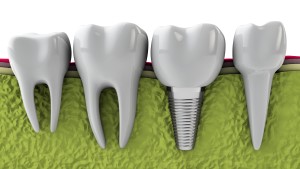16 Feb What factors contribute to the long-term success of dental implants?
 Dental implants are one of the most durable treatments for tooth replacement. If you take good care of them, implants can last for decades. However, it’s also important for the patient to be a good candidate for implant placement initially in order to get the maximum lifespan from your implants.
Dental implants are one of the most durable treatments for tooth replacement. If you take good care of them, implants can last for decades. However, it’s also important for the patient to be a good candidate for implant placement initially in order to get the maximum lifespan from your implants.
The primary component to the stability of the dental implant is the strength of the bond between the surrounding bone and the implant’s surface. Therefore, the patient must have enough bone at the implant site to support the osseointegration process in which that bond forms.
Unfortunately, after tooth loss the jawbone begins to wear away because there is no longer a tooth’s root available to serve as an anchor for it. If patients delay getting dental implants for some time, it’s possible that they may not have adequate bone to qualify for implant placement. In such cases, a preliminary bone graft can provide supplemental bone material to make the patient a suitable candidate for this treatment.
After a thorough examination of your jaw, including x-rays, your oral surgeon will determine if there are any factors that could limit the longevity of dental implants in your case.
Your oral surgeon also cannot place dental implants if there is any active gum disease present. If you have symptoms of gum disease, such as bleeding, red or swollen gums, you likely will need to get a dental cleaning or some other type of periodontal treatment before proceeding with implant placement.
Your long-term oral health is also a factor in the stability of your dental implants, so it’s important to follow a strict oral hygiene routine that includes brushing at least twice a day (for two minutes each time) and daily flossing. Your surgeon will give you other recommendations.
It’s true that dental implants can last for many years, but only under the right circumstances. If you have any concerns about factors that could limit the longevity of your implants, get your oral surgeon’s input on the treatment.
For more information or to schedule your professional consultation, contact the office of Dr. Richard Miller.
